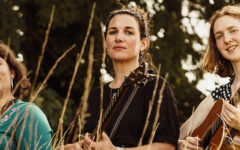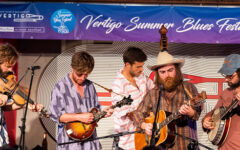
On this day ..
On June 21, 1938, banjo-playing stylist Eddie Adcock was born in Scottsville, Virginia.
Edward Windsor ‘Eddie’ Adcock’s introduction to music came in the shape of an older brother, Frank, whose own interest led to him acquiring instruments, including a tenor banjo, that he learned to play. Eddie, not wanting to be left behind, took every opportunity to learn to play also.
However, it was the guitar and mandolin that Eddie preferred when he first began in those formative years to learn to play music. Later the brothers played and sang as a duo in local churches and on radio stations in nearby Charlottesville.
As there wasn’t a record player in the household and their radio was of limited use, Adcock’s early love for music grew mostly from hearing the live musicians playing at Scottsville’s Victory Hall theatre where many now famous country music stars performed during the 1940s and into the 1950s.
His musical adventures continued as a 14-year-old with a little band in Scottsville—the James River Playboys.
Shortly afterwards he left school and ventured further afield – going to live with his brother Bill and his wife in Alexandria, Virginia – where job prospects were more promising; certainly, better than the intense toil of farm work while his father was hospitalised. It was during this period that Adcock wrote the tune Nightwalk, which he recorded with Starday, Mercury, and Patuxent Music (in 2011).
From just prior to his 16th birthday, Adcock joined Smokey Graves and his group the Blue Star Boys, “finally .. able to get a real job in music,” Adcock admitted to Banjo Newsletter in January 2012. Prompted by Graves saying that he needed a five-banjo player – Adcock was still only playing a little bit of tenor banjo at this time – Adcock bought a Gibson RB-100, which he learned to play in the two to three weeks before starting with the Blue Star Boys. He ‘celebrated’ his birthday with Graves and presenter Jody Rainwater doing a live show at Radio WSVS in Crewe, Virginia.
In the mid-1950s Adcock played briefly, during 1956, with Mac Wiseman, before moving on in quick succession to play with Bill Harrell and the Rocky Mountain Boys, working on Radio WARL, in Arlington, Virginia, (1956- 1957); Buzz Busby and the Bayou Boys; and The Stoneman Family (working with these last two in 1957).
In the July of 1957, while working with Buzz Busby, Adcock was involved in a serious automobile accident sustaining injuries that kept him hospitalised for several weeks.
Having recovered, Adcock went to work as a janitor in a high school in Annandale, Virginia.
That job didn’t last long however, as in April 1958 he went to work for Bill Monroe, with whom he was never going to gain much more than a few muscles to add to his very slim frame as he spent more time working on Monroe’s farm than he did playing his banjo for the Blue Grass Boys. It is ironic that he should be so employed, as it was to get away from farm work that Adcock turned to playing music.
Nevertheless, Monroe did note Adcock’s singing, remarking one time, “that boy’s the best baritone in the business.”
In July of the same year Adcock escaped to Virginia where he landed a job as a sheet-metal mechanic.
His time away from music didn’t last long though, as early in the spring of 1959 he was tempted to join the Country Gentlemen with whom over about 12 years Adcock was to enjoy an extremely fruitful time. With Charlie Waller, John Duffey, and Tom Gray, Adcock helped to create a modern brand of bluegrass music with his improvisational banjo work, those baritone vocals about which Monroe spoke, and the ability to select and arrange some great songs.
The quartet, which has come to be known as the “Classic” Country Gentlemen, recorded for a variety of labels such as Starday, Folkways, Mercury, Design, Rebel, and Rome, and were a considerable factor in making Washington DC the bluegrass as well as the nation’s capital.
In early 1968 Adcock recorded a dozen banjo instrumentals with another innovative banjo picker Don Reno, released by Rebel Records on the album The Sensational Twin Banjos of Eddie Adcock & Don Reno (SLP 1482).
While still playing with the Country Gentlemen, Adcock met singer and guitarist Wendy Thatcher and the duo would play during the intermissions at the Country Gentlemen’s shows.
Ready for a change, in the early part of 1970 Adcock and Thatcher travelled to the West Coast for a brief flirtation with country rock music, playing an electric guitar and performing under the stage name of Clinton Codack (an anagram of “Adcock”) in a group that he dubbed The Clinton Special. He recorded two songs for Rocky Ridge.
After about a year out west, Adcock returned to the east coast and co-opted Jimmy Gaudreau and Bob White to form IInd Generation, playing a more progressive style of bluegrass music. With Thatcher also in the band, they recorded for the Rome and Rebel record companies.
In 1973 Adcock met South Carolina-born Martha Hearon; the couple would marry three years later and they have been together ever since.
With Martha as part of IInd Generation they had five record releases – beginning with Head Cleaner (Rebel SLP 1533) – for Rebel and CMH Records.
Their association with CMH Records continued with the all-instrumental Guitar Echoes (CMH 6236, 1979) – supposedly solo, but Martha is featured playing guitar – and Love Games (CMH 6249, 1980), released under the name Eddie & Martha Adcock.
In the mid-1980s the Adcocks worked for the “outlaw country” musician David Allan Coe, with whom Eddie played a lot of electric lead guitar and, along with Martha, was the main backup singer. According to Eddie, Coe’s three-hour show would often include an hour of bluegrass music.
During the latter part of the 1980s Adcock recorded a ‘solo’ album; Eddie Adcock & His Guitar (CMH 6265) for CMH Records.
Also for CMH Records, Eddie Adcock with Talk of the Town – made up of Martha Adcock, Susie Gott, Missy Raines, and Jody Maphis – had two LPs; Eddie Adcock & Talk of the Town (CMH 6263, released in 1987) and The Acoustic Collection (CMH 9039, 1988).
Also in 1988, Eddie Adcock joined Charlie Waller, John Duffey and Tom Gray to record an album for Sugar Hill Records, Classic Country Gents Reunion (SH-3772, released in 1989) which earned the IBMA’s Recorded Event of the Year for 1990.
In 1990 Adcock, playing guitar as well as banjo, teamed up with fiddler Kenny Baker, dobro stylist Josh Graves and mandolin ace Jesse McReynolds using the apt group name The Masters. The group won the 1990 IBMA Instrumental Recorded Performance of the Year award with their eponymous album for CMH Records (CMH 6266). The release, which featured Martha Adcock and Missy Raines also, was a Grammy finalist as well.
That relationship with CMH Records continued with the release of two albums by the Eddie Adcock Band; Dixie Fried (CMH 6270) and Talk To Your Heart (CMH 6272).
From 1996 through to 2003 the Adcocks were signed with Pinecastle Records for whom they recorded three CDs – Renaissance Man (PRC 1058), Spirited (PRC 1078) and Twograss (PRC 1128); this last-named literally featured the duo, both playing multi-functional roles.
The year 2008 was very significant for Adcock; firstly he teamed up with ex-Country Gentlemen Jimmy Gaudreau and Tom Gray as well as Randy Waller, son of the late Charlie Waller, to record an album for Adcocks’ RadioTherapy Records (RTR-CD-001) as the Country Gentlemen Reunion Band.
The phrase RadioTherapy makes reference to some pioneering surgery performed at Nashville’s Vanderbilt University Medical Center to correct a right-hand tremor that had begun to threaten Adcock’s ability to continue to play the banjo and the guitar. The procedure placed electrodes in Adcock’s brain allowing him to regain controlled use of his picking hand. He had to remain awake, with banjo laid across his lap, while surgeons worked to correct the problem.
He might have preferred fame for more conventional performances rather than that associated with the televised picking in an operating theatre. The ‘Bionic Banjo Man’ became known world-wide as a result of the publicity.
Adcock has had several follow-up operations to fine-tune the procedure.
In 2011 Eddie, Martha, and Tom Gray recorded a Country Gentlemen retrospective called Many a Mile released on the Patuxent label (CD 228).
Last year Patuxent Music released some of Adcock’s older recordings capturing his unique musical wizardry, Vintage Banjo Jam (CD 300), recorded in 1963.
A simple career overview doesn’t reveal many of the multitude of other Adcock accomplishments ..
- Adcock is one of the pioneers of “new acoustic music” or “newgrass,” bringing rock, blues, jazz, rockabilly and folk music styles to bluegrass music.
- He is one of the few truly original banjo stylists, incorporating a self-invented single-string, a pedal-steel style, string-bending, a rhythmic thumb style, an energetic bounce, and unlimited improvisation.
- He invented a number of items of musical and sound equipment, including the Gitbo, a double-necked instrument that incorporates an electric guitar and electrified acoustic banjo.
- Adcock is a member of the IBMA’s Bluegrass Music Hall of Fame, being inducted in 1996 as a member of the classic Country Gentlemen – Charlie Waller, John Duffey, and Tom Gray.
- In 1993 he was inducted into SPBGMA Preservation Hall of Greats.
- He was inducted into America’s Old-Time Country Music Hall of Fame (in 1996).
- He was inducted into the Bill Monroe Hall of Fame (in 2005).
- In 2012 he was presented with the Washington Monument Award.
- Two years later he was presented with the Steve Martin Prize for Excellence in Banjo and Bluegrass Music.
- Adcock has been a board member for the IBMA and the Kentucky Center for Traditional Music.
- He has composed over 130 songs/tunes, including Another Lonesome Morning; Let’s; Another Lonesome Morning (Another Lonesome Day); Too Lonely To Hear The Rain; The Sentence; What Love Can’t Do; State Of Mind; Cedar City Blues; Eddie’s Bounce; El Dedo; Turkey Knob; Champagne Breakdown; Devil’s Run; and the afore-mentioned Nightwalk.
- In addition to the many albums that he has recorded in his own name, Adcock has been a guest on a considerable number of other recordings.
- He pursued a successful side career providing sound amplification for bluegrass festivals as Adcock Audio, starting in the 1970s and continuing until 2006.
- Adcock had a variety of jobs while pursuing his musical quest, including auto mechanic, heating and air conditioning repairman, sheet-metal mechanic, laundry deliverer, dump truck driver, auto parts salesman, and gas station owner.
- He set two track records at the Manassas, Virginia, drag-racing track and won 34 consecutive races with his car, which he named ‘Mr. Banjo’.
- Since 2000 he has hosted numerous benefit concerts, including an annual event for the homeless of Nashville, Tennessee.
- The Adcocks, have appeared on Austin City Limits, Song of the Mountains, Grassroots to Bluegrass, Ernest Tubb’s Midnite Jamboree, TNN’s Nashville Now and Wildhorse Saloon, and a host of NPR specials, as well as syndicated, Internet, and local TV and radio shows worldwide.
- He has made several foreign tours, playing music in Canada, Europe and Japan.
Adcock has spent this week teaching at the Kaufman Kamp in Maryville, Tennessee.
Happy Birthday Eddie. We hope that you are enjoying the longest day.
Some of Adcock’s bluegrass friends have sent their birthday wishes …
Historian Fred Bartenstein remembers traveling to festivals with Adcock …..
“Congratulations on your 80th, Eddie! I have so many happy memories of our times together, especially in the back of your panel van, which you piloted to so many festivals as both headlining artist and sound technician. I think you and I are also charter members of the Pat Mahoney Fan Club; my T-shirt finally wore out. But my regard and love for Eddie Adcock will never wear out.”
Fellow banjo player Greg Cahill remembers one particular stunning performance by Adcock and his fellow band members …..
“Happy 80th to my very good friend Eddie Adcock – a ground-breaking banjo playing stylist, fantastic musician and a wonderful human being I am proud to call my friend.
One distinct memory was seeing Eddie for the first time many, many years ago at a festival that I believe was in Georgia. He had his IInd Generation Band and they had car trouble en-route to the fest. They came running up the hill to the stage (with all instruments) and basically jumped up on stage to begin their set. Even with all the stress and chaos involved in getting to the fest on time they gave an absolutely astounding set of music. Fabulous singing and playing and the crowd went wild – many, like myself, had never heard bluegrass music played this way – superb musicianship and excellent arrangements of songs never before heard in the bluegrass genre. It was truly a remarkable experience I will never forget and I am honored that I have been able to spend time with Eddie (and Martha) on occasion and to have the friendship of a true giant in the world of bluegrass music.”
Janet Deering of Deering Banjos speaks highly of the courage that Adcock showed in undergoing his corrective surgery in 2008 …..
“In celebration of Eddie Adcocks 80th birthday, I will share one of our fondest memories of Eddie. He has always been an innovator and a free spirit in the banjo world. One example of how courageous he has always been is when he went in for open brain surgery while awake, and played his banjo in the operating room while the surgeons found the right location for stimulus to help him control his picking hand. That was off the charts of innovation and dedication as a banjoist. And much to my surprise it worked! He was one of the first people to undergo such a procedure and it took true grit to do so!
Eddie and Martha have been a great match and musical team, they have worked together much like Greg and I have, and we all share a love of our cats. It isn’t an easy road to have a family business but Eddie and Martha have done great things together and have made the world a better place through their music. We wish Eddie a very happy 80th birthday!”
Ron Thomason of Dry Branch Fire Squad marvels at how Adcock was so open to other styles of music ….
“Eddie is and always has been a consummate professional both on the stage and off. He was the first notable bluegrass musician that I had ever met (or even known about) who was so passionate about doing ‘other’ music, and so liberated and confident in his own ability that he enthusiastically left a highly successful, innovative, famous, unique, and ground-breaking band to form his own groups and make his own selections as to whom he performed with, how he presented himself, and how he chose to expand his own extensive musical horizons. I admire him. He has been a friend to me since I first met him.”
Tom Gray is still playing with Adcock after all these years …..
“Happy birthday Eddie! I’m honored to be a bandmate of yours.”
Bass player and songwriter Jon Weisberger is another who remembers Adcock’s friendly nature ….
“Eddie Adcock has been so friendly, and so interesting to converse with that it’s hard for me to even remember when we first met – I feel like I’ve always known him! And as much credit as he’s already gotten for his contributions to bluegrass music, I can’t help but feel that he’s still under-appreciated.
Happy birthday, Eddie, and I hope to see you down the road soon!”
Tom Mindte of Patuxent Music notes …
“Happy Birthday Eddie. You have been an inspiration to all of us. Your music is the gift that keeps on giving every time we listen to it.”
Historian Dick Spottswood speaks highly of Adcock’s technical excellence …..
“When it comes to Eddie Adcock, the superlatives pile up. In his long, productive life, he’s altered the trajectory of an important corner of American popular music, extending and revealing the possibilities of the five-string banjo, the instrument that defines bluegrass in public perception. He’s infused the classic Monroe/Stanley/Wiseman music with the excitement of jazz, accenting the second and fourth beats over country music’s usual first and third, in a style some critics claim is derived from Merle Travis, though Eddie prefers to cite Merle’s mentor Mose Rager as a primary inspiration; steel-guitar-type bent strings and his own single-note work are also essential components of Adcock’s language. He absorbed banjo styles from mountain frailing to jazz, while exploring the banjo’s inner harmonies on his own and invoking a number of additional styles to create his personal musical universe. His first record with the Country Gentlemen in 1959 was made just after his 21st birthday. He sang baritone and played two solos on The Hills and Home. The first solo included Earl Scruggs references but, when Eddie encored, it was with all the stops pulled out, and showed what Mose Rager and Bud Isaacs might have played, had they shared Eddie’s imagination and skill set with a five-string banjo.”
Happy Birthday as well from all your friends at Bluegrass Today!







